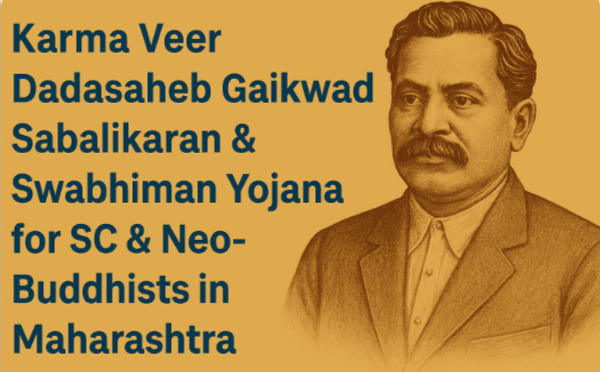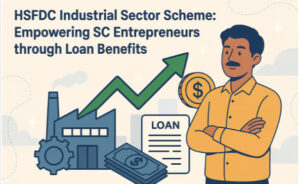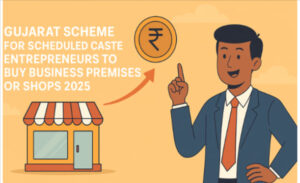The Karma Veer Dadasaheb Gaikwad Sabalikaran & Swabhiman Yojana, implemented by the Department of Social Justice & Special Assistance (SJSA), Government of Maharashtra, is a transformative initiative aimed at uplifting landless workers from Scheduled Caste (SC) communities and Neo-Buddhists. This scheme provides financial assistance in the form of subsidized land to improve the socio-economic status of Below Poverty Line (BPL) families. By offering irrigated or non-irrigated land, the scheme ensures sustainable livelihood opportunities for marginalized communities.
Objective of KVDG Sabalikaran & Swabhiman Yojana
The primary objective of this scheme is to empower landless individuals from SC and Neo-Buddhist communities by providing them with agricultural land. The scheme seeks to;
- Alleviate poverty among BPL families.
- Promote self-reliance through land ownership.
- Improve the socio-economic status of Scheduled Castes and Neo-Buddhists.
- Ensure equitable access to resources and opportunities for marginalized groups.
Key Benefits of the Scheme
- Land Allocation:
- Beneficiaries are provided with 2 acres of irrigated land or 4 acres of non-irrigated land.
- The cost of the land is divided into two parts:
- 50% subsidy funded by the Government of Maharashtra.
- 50% loan, which must be repaid as per the terms agreed upon.
- Targeted Support:
- The scheme focuses on empowering landless workers who lack access to productive assets.
- It aims to provide sustainable livelihood opportunities through agriculture.
- State Funding:
- The scheme is 100% funded by the Government of Maharashtra, ensuring complete financial support for subsidies.
Eligibility Criteria
To qualify for the benefits under this scheme, applicants must meet the following conditions:
- Citizenship: The applicant must be a citizen of India.
- Residency: The applicant must be a permanent resident of Maharashtra State.
- Age Group: The applicant must be between 18 to 60 years of age.
- Community: The applicant must belong to the Scheduled Caste community or be a Neo-Buddhist.
- Landlessness: The applicant must not own any land.
- Income: The applicant must belong to the Below Poverty Line (BPL) category.
Note: Only citizens residing permanently in Maharashtra are eligible. Applicants from neighboring states like Gujarat, Madhya Pradesh, Chhattisgarh, or Telangana are not eligible.
How to Apply – Offline Process
The application process for the scheme is entirely offline. Here’s how you can apply;
- Visit the District Social Welfare Office and request a hard copy of the prescribed application form.
- Fill in all mandatory fields in the application form. Paste a passport-sized photograph (signed across) and attach self-attested copies of all required documents.
- Submit the duly filled and signed application form along with the documents to the Assistant Commissioner, District Social Welfare Office.
- Obtain an acknowledgment receipt for the successful submission of your application.
Essential Documents
To ensure smooth processing of your application, make sure you have the following documents ready;
- BPL Card: Proof of being Below the Poverty Line.
- Aadhaar Card: For identity verification.
- Proof of Age: Birth certificate, marksheet of Class 10th/12th, or any other valid proof.
- Passport-Sized Photographs: Two photographs signed across.
- Residential Certificate/Domicile Certificate: Proof of permanent residence in Maharashtra.
- Caste Certificate: Issued by the Revenue Department, Government of Maharashtra.
- Include a certificate mentioning “Nau Bouddha,” “Converted Buddhist,” or “Neo Buddhist” if applicable.
- Bank Account Details: Bank name, branch name, address, IFSC code, etc.
- Any Other Documents: As required by the District Social Welfare Office.
Frequently Asked Questions (FAQs)
Q1. What percentage of the scheme benefit is provided as a subsidy?
A1. 50% of the land cost is provided as a subsidy by the Government of Maharashtra.
Q2. What percentage of the scheme benefit is provided as a loan?
A2. 50% of the land cost is provided as a loan to the beneficiary.
Q3. What should be the area in case the beneficiary is provided with irrigated land?
A3. The beneficiary will receive 2 acres of irrigated land.
Q4. What should be the area in case the beneficiary is provided with non-irrigated land?
A4. The beneficiary will receive 4 acres of non-irrigated land.
Q5. Who are the Neo-Buddhists?
A5. Neo-Buddhists, also known as Nav-Buddhists, are individuals who have converted to Buddhism from other religions, particularly Hinduism.
Q6. Who are the target beneficiaries of this scheme?
A6. The scheme targets landless workers from Scheduled Caste communities and Neo-Buddhists who are below the Poverty Line (BPL).
Q7. What are the objectives of this scheme?
A7. The objectives include improving the socio-economic status of SC and Neo-Buddhist communities, promoting self-reliance, and alleviating poverty.
Q8. What is the full form of SJSA?
A8. Social Justice & Special Assistance.
Q9. Is this a state-funded or centrally funded scheme?
A9. This is a state-funded scheme, fully supported by the Government of Maharashtra.
Q10. Can applicants from neighboring states like Gujarat, Madhya Pradesh, Chhattisgarh, etc., also apply to this scheme?
A10. No, only permanent residents of Maharashtra are eligible.
Q11. Where can I find the link to the scheme guidelines?
A11. Guidelines are available on the official SJSA website or at District Social Welfare Offices.
Q12. Is there an age-related criterion for this scheme?
A12. Yes, applicants must be between 18 to 60 years of age.
Q13. Is there an income-related criterion for this scheme?
A13. Yes, applicants must belong to the Below Poverty Line (BPL) category.
Q14. Where can I find the format of the application form? Is it available online?
A14. The application form is available offline at District Social Welfare Offices. It is not available online.
The “Karma Veer Dadasaheb Gaikwad Sabalikaran & Swabhiman Yojana” is a groundbreaking initiative by the Maharashtra government to uplift landless workers from Scheduled Caste and Neo-Buddhist communities. By providing access to agricultural land, the scheme empowers beneficiaries to achieve self-reliance and improve their socio-economic status. If you’re a landless worker from these communities, don’t miss out on this opportunity to secure financial assistance and build a better future.


